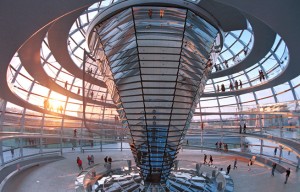 Germany isn’t known as a place with lots of sunshine. Yet it has become a world leader in solar and renewable energy. In 2000 the Green Party led by Hans – Jofsef Fell who was involved in the creation of the Energy Watch Group helped create Germany’s Renewable – Reichstag in Berlin – A solar gem
Germany isn’t known as a place with lots of sunshine. Yet it has become a world leader in solar and renewable energy. In 2000 the Green Party led by Hans – Jofsef Fell who was involved in the creation of the Energy Watch Group helped create Germany’s Renewable – Reichstag in Berlin – A solar gem
- Energy Sources Act which provided incentives to encourage the use of renewable energy. In 1998 30,000 people were employed in renewable energy related jobs including solar. In 2010 that number had increased ten times to over 300,000. A remarkable fete that helped stabilize the country during the recent global financial crisis, cut pollution and reduced Germany’s dependence on foreign sources of energy and fossil fuels. By 2009 it was receiving 16% of its energy from renewable energy ahead of its goal of 12% by 2010. German officials are predicting it will be using 100 % renewable energy by 2030.
Hans – Jofsef Fell along with Elicke Weber were panelist at the recent the InterSolar conference in San Francisco. InterSolar North America is an international trade show and conference for information and education on solar photovoltaic products and services. InterSolar also conducts conferences in Munich, Shanghai and Mumbai. Fell has traveled the globe as an agent of change for green clean renewable energy. Following his visit to Turkey, plans for a nuclear power plant at Akkuyu were stopped, and Prime Minister Bülent Ecevit declared that his government would foster renewable technologies. In Taiwan, following Fells’ television appearances and talks with individual policy makers, the government announced the withdrawal of its plans to build the country’s fourth nuclear power plant, and its intent to phase out nuclear power by 2020. Prof. Dr. Elicke Weber has an international reputation as a materials scientist and is one of the world’s leading researchers in the field of renewable energy and energy efficiency. In 2006, he became director of the Fraunhofer Institute for Solar Energy Systems ISE in Freiburg. The Fraunhofer Institute is one of the world’s leading research organizations for solar energy technologies. It draws on a network of scientists offering a broad portfolio of skills covering the entire process chain of solar energy systems. Prior to joining Fraunhofer ISE, Prof. Weber spent 23 years at UC Berkeley. Both Fell and Weber are global leaders in the area of sustainable energy and are discussions with California and US energy officials.
The Energy Watch Group founded in 2006 which Hans – Jofsef Fell now leads functions with the understanding that energy-political decisions are still made on the basis of information which is outdated and motivated by special interests. In many countries further nuclear reactors and coal power stations are to be built although the fuels are knowingly becoming scarce. The Energy Watch Groups’ purpose is to help governments secure power supply on a long-term basis at affordable prices, avoid of conflicts about energy, and establish effective climatic and environmental policy that’s based on the necessary scientific unobjectionable information, independent of economic interests for a sustainable energy policy. The Germans are doing it and so can the United States.
_______________________
Carolinas Among First Regional EV Charging Markets
 A member of US-CAP, Duke Energy plans to build its own car-charging infrastructure in South Carolina as the Nissan Leaf (all battery-electric) and Chevy Volt (plug-in plus extended range) and other plug-in electric vehicles start to become available in the US later this year.
A member of US-CAP, Duke Energy plans to build its own car-charging infrastructure in South Carolina as the Nissan Leaf (all battery-electric) and Chevy Volt (plug-in plus extended range) and other plug-in electric vehicles start to become available in the US later this year.
According to Mike Rowland, Duke Energy’s director of advanced customer technology, speaking to the Electric Drive Transportation Association, Charlotte and Raleigh will be among the dozen or so U.S. cities with the most demand for EVs. A study last year recommended that with such a massive switch in fuel and infrastructure, that the US needed to plan an organized roll-out with a series of regional hubs with a certain density of public fast-charging stations, and once these are established, to then fill out the infrastructure to include wider regions of the nation. Unlike the first regional hubs such as California, the Carolinas do not already get a high percentage of electricity from low carbon sources, including hydro and nuclear power.
Electric vehicles help the environment most if they are rolled out in areas where they will use renewable energy, but even on a typical (45% coal-powered) grid, create less greenhouse gas than gasoline vehicles. North Carolina has a Renewable Energy Standard and must begin to add increasing amounts of renewable energy to the grid (North Carolina, 10 – 16% by 2021. South Carolina has no RES but an assortment of incentives and building codes encouraging a greener grid.
Duke itself has pioneered distributed solar installations as part of meeting renewable requirements. Several companies are competing to provide public fast-charging infrastructure in the US. While most charging will be done relatively slowly, overnight at home, a speedy fill-up will also be needed at public charging stations, and a network is planned in several key regions to facilitate the adoption of the first electric vehicles in the US.
As part of a $37 million program with the Department of Energy, San Jose-based Coulomb Technologies will roll out 4,600 stations in nine US regions. PG&E just installed the first Fast Charge station in the nation, midway between Sacramento and the Bay Area, in Vacaville. Nissan will work with California’s Aerovironment to develop South Carolina’s network of EV-charging stations, among more than 260 fast charge stations in other key “first adopter regions” around the US. With the announcement by the DOE of a limited number of regional hubs to receive infrastructure support, there has been great competition to be among the chosen first adopter regions. South Carolina was among those that succeeded in making the case for being among the first early hubs, with help from the state’s major utilities like Duke, the advocacy of non-profit Plug In Carolina and the presence in the state of a substantial automotive parts and components industry.
_______________________
GE ECOMAGINATION CHALLENGE
The GE Ecomagination Challenge
Is a $200 million innovation experiment where businesses, entrepreneurs, innovators and students
share their best ideas on how to build the next-generation power grid – and just might get funded.
__________________________________
BP Fall Fashion
_______________
Visit these sections below
SUBSCRIBE TO UPDATES HERE
EVENTS –
UPDATED
INSIGHT –
N THE MIX – webcasts
 TV
TV
VIDEO -
SUBSCRIBE TO UPDATES HERE
QUESTPOINT GOES MOBILE – Beta
Just log in from your iPhone, Blackberry or mobile device to get the latest stories, audio and video.



